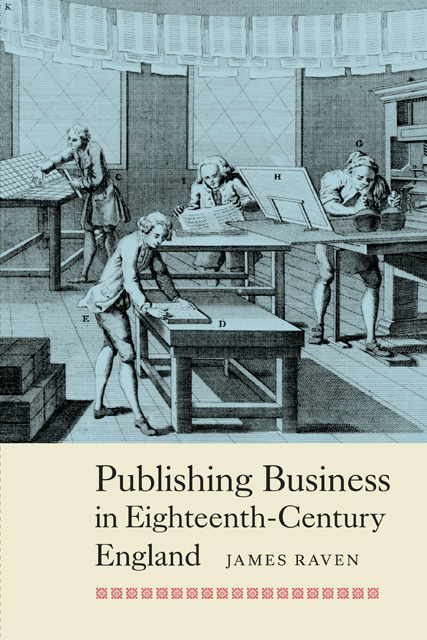Book contents
- Frontmatter
- Dedication
- Contents
- Acknowledgements
- Notes on Dates, Booksellers, Founts and Intaglio
- List of Abbreviations
- 1 The Mediation of the Press
- 2 England and the Uneven Economic Miracle
- 3 The Printed and the Printers
- 4 Serviced by Stationery and Printing
- 5 Printing and the City of London
- 6 Advertising
- 7 The Advertisers
- 8 Intelligence
- 9 Instruction and Guidance
- 10 Wider Discussion
- 11 Business, Publishing and the Gentleman Reader
- Conclusion
- Bibliography of Printed Sources
- Index
- Frontmatter
- Dedication
- Contents
- Acknowledgements
- Notes on Dates, Booksellers, Founts and Intaglio
- List of Abbreviations
- 1 The Mediation of the Press
- 2 England and the Uneven Economic Miracle
- 3 The Printed and the Printers
- 4 Serviced by Stationery and Printing
- 5 Printing and the City of London
- 6 Advertising
- 7 The Advertisers
- 8 Intelligence
- 9 Instruction and Guidance
- 10 Wider Discussion
- 11 Business, Publishing and the Gentleman Reader
- Conclusion
- Bibliography of Printed Sources
- Index
Summary
Literary historians and sociologists have spoken of the social impact of print as a form of restructuring consciousness. Historical reconstructions of attitudinal change have been greatly assisted by broad questions about the penetration of literature in society through studies of production, retail, borrowing and circulation, about the use to which books were put, and about the objective of writers and the confidence placed in their message.1 The broader question of ‘printedness’ raised issues, as also addressed by earlier chapters here, particularly in relation to jobbing printing and the production of small printed items. The history of publishing that informed and assisted business does benefit, however, from revisiting the more traditional focus of the ‘book’. The widening of the type and volume of publication and the extension of distribution networks have already been seen in relation to the servicing of the business community. Print replicated and circulated business news, standardized teaching and supported proposition and protest. In the full community, one effect of literature was to establish tacit rules affecting the direction of subsequent writing. Contributors were urged to consider the improvement of society and search for both explanatory and predictive laws.
By the end of the century, more Britons than ever before had been able to read about the characteristics of commerce and industry. The expansion of both print and trade intensified debate over the origins and consequences of financial and commercial transactions. Professional disputants, from Grub Street hacks to scholarly writers on ethics and political arithmetic, were occupied by questions concerning the intended or unintended consequences of what is now loosely called ‘economics’. Country gentlemen, clerics and amateur followers of commerce took to publishing tracts about trade for themselves. Even the general use of language was transformed. Increasing familiarity with economic acts brought a semantic narrowing of such words as ‘fortune’, ‘corruption’ and ‘interest’. The words ‘tradesman’ and ‘manufacturer’ assumed completely new interpretations.
The history of popular inquiry into such topics as trade, finance and population, and the actual dynamic of print in the transmission of economic theories and histories in the eighteenth century, still requires more research, despite the vast literature that engages with the intellectual origins of political economy and political arithmetic.
- Type
- Chapter
- Information
- Publishing Business in Eighteenth-Century England , pp. 206 - 229Publisher: Boydell & BrewerPrint publication year: 2014

